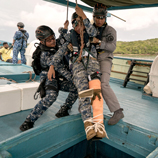 Trincomalee (Sri Lanka), 7 January 2020 - The United Nations Office on Drugs and Crime (UNODC) conducted a Visit, Board, Search and Seizure (VBSS) exercise at the Sri Lanka Navy Base in Trincomalee in November 2019. The exercise is part of a VBSS Boarding Officer training course delivered by UNODC's Global Maritime Crime Programme (GMCP) to coastguards from Malaysia, Indonesia, the Philippines, Thailand and Vietnam with the support of the Sri Lanka Navy.
Trincomalee (Sri Lanka), 7 January 2020 - The United Nations Office on Drugs and Crime (UNODC) conducted a Visit, Board, Search and Seizure (VBSS) exercise at the Sri Lanka Navy Base in Trincomalee in November 2019. The exercise is part of a VBSS Boarding Officer training course delivered by UNODC's Global Maritime Crime Programme (GMCP) to coastguards from Malaysia, Indonesia, the Philippines, Thailand and Vietnam with the support of the Sri Lanka Navy.
The UNODC Director of Global Operations, Miwa Kato, visited the Sri Lanka Navy Base in Trincomalee to witness the exercise. The event was also attended by the heads of diplomatic missions of each participating country, senior officials from UNODC and the Sri Lanka Navy. Akira Sugiyama, Ambassador of Japan in Sri Lanka, a major supporter of GMCP's work in the region, also attended the event.
Mr. Sugiyama said that "This program provides maritime law enforcement officers in the Indo-Pacific region with precious opportunities to receive training for the VBSS procedures, using actual dhow boats captured by the Sri Lankan Navy. In addition, through this intensive program, comradeship among law enforcement officers in the region is developed. We believe that this program contributes a great deal to the maritime security in the Indo-Pacific region, which is vital to maintain a free and open Indo-Pacific."
On the occasion of the exercise, Ms. Kato also participated in the ground-breaking ceremony for the construction of a new classroom for maritime courses and a VBSS search simulator. Ms. Kato said: "We at UNODC through the Global Maritime Crime Programme seek to bring safety to the oceans of the world. We do this by providing practical training and regional collaboration opportunities. These improvements at Trincomalee will undoubtedly increase the quality of VBSS training courses, not only strengthening the capacity of law enforcement officers from South Asian and South East Asian countries but benefiting the general population in combating transnational organized crime by sea."
The visit to Trincomalee, organized by GMCP headquartered in Colombo, was the conclusion of a series of meetings during a three-day mission to Sri Lanka during which Ms. Kato met with high-level representatives of the Sri Lanka's Ministry of Defence, Ministry of Justice and Ministry of Foreign Affairs, to discuss key areas of support by UNODC, including prevention of drug use and rehabilitation, as well as prisoners' welfare.
As part of ongoing UNODC programming in Sri Lanka, Ms. Kato and senior officials from GMCP visited Welikada Prison in Colombo, where GMCP had conducted an assessment involving the management of high-risk prisoners and the enhancement of security levels within prison facilities. Aligned with these endeavours, copies and practical guides of The United Nations Standard Minimum Rules for the Treatment of Prisoners (the Nelson Mandela Rules) in Sinhalese and Tamil 1 were handed over to prison officers to continue improving the appliance to human rights within the prison environment.
Alan Cole, Head of GMCP, said that, after holding several meetings with senior prison officers and visits to various prison facilities, "UNODC has been proactive in planning the upcoming training courses for next year, targeting prison staff on high security wings within the framework of handling high-risk prisoners".
VBSS training courses delivered by UNODC are possible thanks to the generous support of the Government of Japan, a contributor to UNODC's efforts to counter transnational organized crime globally.
1 Translations of the Nelson Mandela Rules to Sinhalese and Tamil were possible thanks to the support of the International Committee of the Red Cross (ICRC) in Sri Lanka.
Video on VBSS exercise November 2019
UNODC Global Maritime Crime Programme
The United Nations Standard Minimum Rules for the Treatment of Prisoners (the Nelson Mandela Rules)